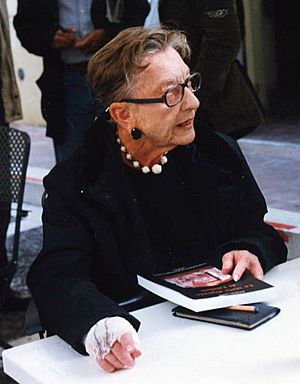Honor Frost facts for kids
Quick facts for kids
Honor Frost
|
|
|---|---|

Honor Frost
|
|
| Born | 28 October 1917 Nicosia, Cyprus
|
| Died | 12 September 2010 (aged 92) |
| Scientific career | |
| Fields | Underwater archaeology |
| Institutions | Institute of Archaeology |
Honor Frost (born October 28, 1917 – died September 12, 2010) was a very important person in underwater archaeology. She was a pioneer, meaning she was one of the first to do this kind of work. She led many underwater digs in the Mediterranean Sea, especially in Lebanon. She was also known for her special way of classifying old stone anchors and for her amazing drawings of archaeological finds.
Contents
Early Life and a Love for Diving
Honor Frost was born in Nicosia, Cyprus, on October 28, 1917. She was the only child in her family. Sadly, she lost her parents when she was very young. She then became the responsibility of Wilfred Evill, a lawyer and art collector in London.
Honor went to art school and even helped design sets for ballet shows. She also worked at Tate Britain, a famous art museum. But she was also very adventurous! One time, at a party, she put on an old World War II diving suit. She then dove into a 17th-century well in a friend's backyard.
From that moment on, Honor loved diving. She once said that "Time spent out of the water was time wasted." This shows how much she enjoyed exploring under the sea.
Exploring the Underwater World
Honor Frost became a diver soon after Jacques Cousteau invented SCUBA gear. SCUBA allows divers to breathe underwater using tanks. In the early 1950s, she worked as a diver and artist in France and Italy.
She was part of the world's first SCUBA diving club, called the Club Alpin Sous-Marin. Her first experience digging up old shipwrecks underwater was with a diver named Frédéric Dumas.
Discovering Ancient Shipwrecks
An exciting trip to Turkey led to a big discovery. They found a very old shipwreck from the late Bronze Age at a place called Gelidonya. Honor Frost was key in understanding how important this wreck was.
The wreck had been found earlier by a Turkish diver and an American photo-journalist. But it was Honor who realized that the ship was not from the Mycenean people. Instead, she saw it was from the Phoenicians. This was a huge discovery! It was the first proof that Phoenicians were trading by sea even before the Iron Age began.
Honor convinced Joan du Plat Taylor, another archaeologist, to help lead the dig at Gelidonya. This site later became famous for being where George Bass and Peter Throckmorton did their first underwater archaeology work. The Bronze Age shipwreck was from the 12th century BC. At that time, it was the oldest known shipwreck in the world. The way they dug up this wreck was very special. It was the first time an underwater excavation was done using a strict scientific method.
Leading Underwater Expeditions
In 1968, Honor Frost led a UNESCO expedition. UNESCO is a part of the United Nations that promotes education and culture. Her team explored the site of the ancient Pharos in Egypt. This lighthouse was one of the Seven Wonders of the Ancient World. For her pioneering work in Egypt, she received a special medal from the French government in 1997.
Starting in 1971, she also led the investigation of the Marsala Punic Warship. This ancient warship was found in Sicily, Italy.
In 2005, the BSAC gave her the Colin McLeod award. This award was for "Furthering international co-operation in diving." It recognized her efforts to bring people together in underwater archaeology.
Honor Frost passed away on September 12, 2010. She had inherited a large art collection from Wilfred Evill. This collection was later used to create the Honor Frost Foundation. This foundation provides money to support underwater archaeology projects in the Mediterranean Sea. Her notes, drawings, and reports are kept at the University of Southampton Library. Many of her books are also there.
Personal Life and Legacy
Honor Frost had a second home in Malta. Her main home was in Marylebone, London, which she inherited from Wilfred Evill. In this home, she had a very important collection of artworks. These were mostly by British painters from the 20th century, especially Stanley Spencer.
After she died, this art collection was sold. The money from the sale became the main funding for the Honor Frost Foundation. This foundation continues her important work in underwater archaeology today.
See also
 In Spanish: Honor Frost para niños
In Spanish: Honor Frost para niños

